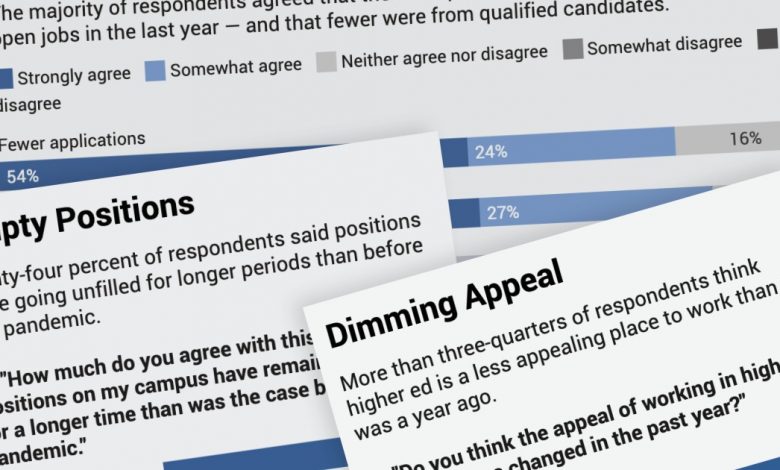Higher Ed Is Looking to Refill Jobs. But It’s Finding a ‘Shallow and Weak’ Candidate Pool

[ad_1]
While higher education has largely recovered nearly all of its pandemic-associated job losses, the task of recruiting and hiring administrators and staff members has become a daunting one, according to a Chronicle survey of college leaders, hiring managers, and administrators that was conducted with support from the Huron Consulting Group.
Nearly 80 percent of the 720 respondents said their campus has more open positions this year than last, and 84 percent said that hiring for administrative and staff jobs has been more difficult in the last year.
Those positions are harder than ever to fill, too: 78 percent of leaders said their campus had received fewer applications for open jobs in the last year, and 82 percent agreed that they’d fielded fewer applications from qualified candidates. Said one person who took the survey: “The pools have been shallow and weak.” At the same time, candidates have upped their salary demands.
There’s a clear reason for that: 77 percent of respondents — among them presidents, deans, human-resources leaders, and other senior officials — said that higher education is a less appealing place to work than it was a year ago (the survey was conducted between June 14 and July 1). That sets up a fundamental tension: If hiring managers and campus leaders so readily acknowledge that working in higher education isn’t what it used to be, how do they make the case for the sector, and for their own institutions?
There is, of course, no simple solution. Some institutions have tried casting a wider net for open jobs — a quarter of respondents said they’d advertised open positions more widely in the past year, and an additional 24 percent said they’d also changed the content or presentation of their job ads.
“You can’t just post and pray anymore,” said Staci Sleigh-Layman, the executive director of human resources at Central Washington University. “You can’t just put an advertisement out and hope that people will respond to it.”
So Sleigh-Layman and her team at Central Washington, a public institution in Ellensburg, have on occasion worked with a contractor to do regional recruitment for a particular position. At Gettysburg College, in Pennsylvania, officials have also elected to take a “pay to play” approach for some jobs, said Andy Hughes, executive director of Gettysburg’s Garthwait Leadership Center. In one case, that meant paying to list an administrative-assistant job on the job-search website Indeed, a step the college wouldn’t ordinarily take. The human-resources department at Gettysburg also hosted its first job fair to recruit new dining and facilities-management staff.
‘Barely Any Applicants’
Half of respondents to the Chronicle survey said they’d lowered the barrier to entry in order to recruit more candidates. Of that number, nearly 60 percent lowered the minimum educational experience and relevant work experience. Central Washington University is among those. “When you were getting 50 applicants for a job, requiring a high-school diploma was an easy way to make that first cut,” Sleigh-Layman said. In removing some educational and work-experience requirements, she said, Central Washington is looking more closely at applicants’ “baseline qualities as a person: Can you get here on time? Can you communicate effectively? Can I trust you to do your work without looking over your shoulder?”
To do that, Sleigh-Layman and her team have emphasized in-person interviews with candidates rather than relying on paper screening. “We’re really trying hard to take advantage of every application that we get,” she said. Still, their applicant pools are small. Sleigh-Layman recently ran a search for an administrative assistant, a job that in the past would have received 40 or 50 applicants. This time, she said, she got fewer than 10. She interviewed six or seven applicants, but none were the right fit. “I would have taken somebody that I could have trained, but no one in the pool had even the minimal experience” to make that investment worthwhile. Elsewhere on campus, Central Washington used to have waiting lists for people looking for custodial jobs. Now, Sleigh-Layman said, the campus has 10 openings for those positions and “barely any applicants” to fill them.
So when a promising job application comes in, officials often move quickly to woo that candidate because he or she is likely able to leverage interest from multiple employers, including in the corporate world.
“Gone are the days of having a month for people to submit applications,” said Joseph A. Favazza, president of Saint Anselm College, a private liberal-arts institution in New Hampshire with around 2,000 students. “If we get three or four applications in the first week, we’re going to act on those right away.” What’s more, he said, in certain areas, “almost inevitably,” Saint Anselm winds up paying new hires more than it budgeted.
Favazza said he’s even been vying for candidates alongside peer institutions that have upped their recruitment game, in some cases directly poaching highly skilled workers from Saint Anselm. In areas like information technology, financial aid, enrollment, and advancement, Favazza said, employees have been called by another higher-education institution that’s prepared to pay them tens of thousands more than their current salary. “It’s not even a ‘Here’s a position, are you interested? Apply, and who knows what will happen,’” Favazza said. “No, this is like, ‘I want you, and this is what we’ll pay you, and can you start in two weeks?’”
[ad_2]
Source link






